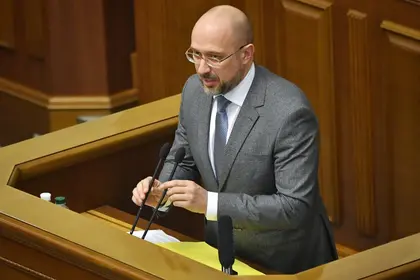In Ukraine, change isn’t always good, but it often is lightning fast.
On March 4, Denys Shmygal became Ukraine’s new prime minister and the leader of a largely new Cabinet of Ministers. In total, 291 lawmakers, most of whom represent the pro-presidential Servant of the People party, supported the 44-year-old official’s nomination.
“People’s patience is running out,” Shmygal said in parliament. “We need reforms now.”
Shmygal succeeded Oleksiy Honcharuk, who resigned after six months in office, as part of a massive shakeup in which only six out of 18 ministers kept their jobs.
Shmygal, a professional accountant, rose to prominence while working for energy company DTEK, owned by billionaire oligarch Rinat Akhmetov.
Shmygal’s first speech didn’t go as planned. He offered no agenda, saying it would be drawn up in the near future. He also incorrectly stated the legal requirements for appointing his Cabinet. Finally, while presenting the only woman minister in his Cabinet, he offered an awkward platitude to defend himself against accusations of sexism.
Many of Ukraine’s reformers and Western partners are worried. Political analyst Vitaly Bala thinks Shmygal won’t be an independent figure. “These appointments signal that the new government will now be an extension of the president’s office,” Bala told the Kyiv Post.
Changing faces
Honcharuk, the youngest prime minister in Ukraine’s history, had struggled recently with waning support from the president and parliament since recordings of him and other Cabinet members discussing the president in unflattering terms were leaked online in January.
Appointed on Aug. 29, Honcharuk has also faced strong criticism for his slow delivery of promised reforms. Six months into the job, his Cabinet’s disapproval ratings were already well over 50%.

Shmygal, who joined the previous government in February, is an accountant and economist who has worked in this sector since the late 1990s. But he is also a veteran of government and politics.
In 2009, Shmygal took a job leading the economic department of the Lviv Oblast government. His department was also tasked with attracting investment. He left the regional government in 2014 to run for parliament as an independent candidate through a Lviv single-member district, yet received less than 1% of the vote.
In 2015, he ran for a seat in the Lviv Oblast Council, yet once again fell short. After a brief stint as head of a local retail chain, Shmygal took a job at DTEK in 2017.
He became deputy head of DTEK Zahidenergo, a regional energy company that produces over 9% of Ukraine’s electricity. A year later, he took charge of one of its power plants situated in Ivano-Frankivsk Oblast.
In the past, former employees of DTEK have gone on to serve as proxies for Akhmetov in government and politics.
That said, according to Shmygal, he was chosen through an open tender procedure and didn’t have any substantial ties with Akhmetov during his work for DTEK.
“I saw Rinat Akhmetov the same way as you do, on television,” Shmygal said in July during an interview with a local news outlet after he was appointed governor of Ivano-Frankivsk Oblast. “I never had an opportunity to talk with him in real life.”
After Zelensky’s inauguration in May, Shmygal lost an online poll to become governor of Lviv Oblast. However, less than a month later, he was appointed head of the neighboring oblast. During his time as governor, he was publicly praised by Zelensky, who called Shmygal a “powerful manager.”
Setting expectations
When presented to parliament, Shmygal outlined his main priorities as prime minister, almost repeating Zelensky’s speech minutes earlier word-for-word.
“We must immediately revise the 2020 budget, increasing pensions,” Shmygal said. He added that the money owned to state coal miners must be paid right away.
To round up that money, Shmygal said that the salaries of government officials must be lowered. “We must reduce the bonuses paid to ministers of the new government and to members of a number of (state companies’) supervisory boards,” he said.
The previous government and a number of state-owned companies were criticized for paying premiums that were much higher than the average wage in Ukraine, which stood at $500 as of Jan. 1.
For example, the head of Ukrposhta, the state postal service, received Hr 1.5 million ($60,000) in December. The company’s average wage was $250 in 2019.
In the same speech, Shmygal promised to develop a program to combat coronavirus and to better communicate with Ukrainians in order to prevent panic.
On Feb. 20, panic overtook the small rural town of Novi Sanzhary, 350 kilometers southeast of Kyiv, where evacuees from the epicenter of the coronavirus outbreak in China were quarantined in a nearby sanatorium. Local residents feared they could be infected with the virus, although none of the evacuees showed symptoms of or tested positive for the illness.
The locals blocked the road, threw stones at the busses carrying the evacuees and clashed with police. Twenty-nine people were arrested for taking part in the unrest, which underscored the government’s inability to communicate with local residents.
Shmygal also expressed his desire to strengthen the economy.
“(We) should ensure the growth of industrial and agricultural output,” said Shmygal. “Now we only see the growth of the hryvnia, which harms exports and doesn’t improve the wellbeing of Ukrainians.”
In addition, he promised to maintain the decentralization reform implemented since 2014 and other reforms of the previous government, yet said that the medical reform initiated by Health Minister Ulana Suprun, who served under President Petro Poroshenko, must be reevaluated.
“We must ensure that the result of this medical reform does not lead to the collapse of the entire industry,” he said.
During his presentation, Shmygal also thanked Zelensky for placing his trust in him.
“If the new Cabinet doesn’t perform, it will be out. We understand that well. We saw it today,” Shmygal said, referring to Honcharuk’s resignation after six months in office.
Fumbling start
Opposition lawmakers gave the new prime minister a cold welcome: They demanded that he submit his candidates for the Cabinet not as a package, but as separate nominees, leaving space for discussion. This request especially targeted Arsen Avakov, who has been the interior minister since 2014 and is about to enter his fifth Cabinet. Avakov has faced serious accusations of sabotaging reforms and corruption.
In response, Shmygal said that he had to submit the candidates as one package because of legislation regulating the work of the Verkhovna Rada. Dmytro Razumkov, speaker of the Rada, supported this position.
However, the two were soon accused of lying. The law on the Cabinet of Ministers leaves both options open — candidates for ministers can be submitted separately or as a package.
Shmygal fumbled once more when presenting his new ministers for a parliamentary vote. After finishing naming all future ministers, he was reminded that he forgot to present Maryna Lazebna, the nominee for the Ministry of Social Policy.
“Oh, sorry, I missed it! To your attention, the Minister of Social Policy, a Ph.D., a woman,” said Shmygal, sparking an uproar among lawmakers. He soon tried to backtrack. “I’m hardly a sexist. I have two daughters,” Shmygal said, drawing further backlash. Lazebna is the only woman in the new government.
Shmygal’s repetition of Zelensky’s speech and his lack of a concrete program suggests he is heavily dependent on the president, says Bala.
“The government changes were made to stop Zelensky’s political rating from falling,” he told the Kyiv Post. “If the numbers keep dropping, more changes will come.”
You can also highlight the text and press Ctrl + Enter




